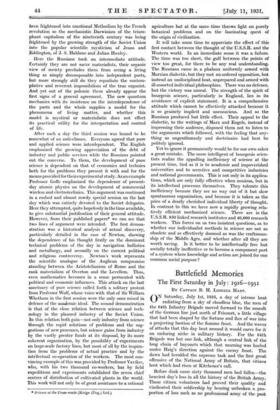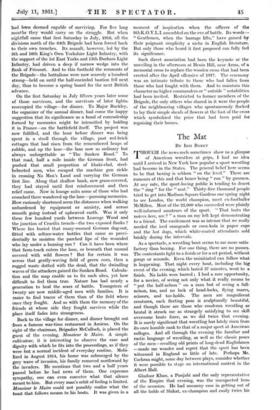Battlefield Memories
The First Saturday in. July: 1916-1931
BY CAPTAIN B. H. LIDDELL HART.
ON Saturday, July 1st, 1916, a day of intense heat radiating from a sky of cloudless blue, the men of the 64th Infantry Brigade moved forward to the assault of the German line just north of Fricourt, a little village that had been shaped by the fortune and flux of war into a projecting bastion of the Somme front. And the waves of attacks that this day. beat around it would carve for it an enduring niche in military history. For the 64th Brigade was but one link, although a central link of the long chain of bayonets which that morning was hurled under Haig's direction against the enemy front. The dawn had heralded the supreme task and the first great offensive of the National Army of Britain, that citizen host which had risen at Kitchener's call.
Before dusk came sixty thousand men had fallen—the heaviest day's loss in all the history of the British Army. Those citizen volunteers had proved their quality and vindicated their soldiership by bearing unbroken a. pro- portion of loss such as no professional army of the past had been deemed capable of surviving. For five long months they -would carry on the struggle. But when nightfall came that first Saturday in July, 1916, all the divisions north of the 64th Brigade had been forced back to their own trenches. Its assault, however, led by the 9th and 10th King's Own Yorkshire Light Infantry, with the support of the 1st East Yorks and 15th Durham Light Infantry, had driven a deep if narrow wedge into the flank of Fricourt. And to this foothold the remnants of the Brigade—the battalions were now scarcely a hundred strong—held on until the half-encircled bastion fell next day, thus to become a spring board for the next British advance.
On the first Saturday in July fifteen years later some of those survivors, and the survivors of later fights, reoccupied the village—for dinner. To Major Buckley, the organizer of the annual dinner, had come the happy 'suggestion that its significance as a bond of comradeship formed by memories might be intensified by holding it in France—on the battlefield itself. The project was now fulfilled, and the hour before dinner was being spent in a stroll through the village, past red-brick cottages that had risen from the remembered heaps of rubble, and up the lane—the lane now so ordinary but always unforgettable as "The Sunken Road." To that road, half a mile inside the German front, had pushed that small proportion of khaki-clad, steel- -helmeted men, who escaped the machine gun sickle in crossing No Man's Land and carrying the German first line. Along that shallow bank, now grass-covered, they had stayed until first reinforcement and then relief came. Now in lounge suits some of those who had crouched there wandered up the lane—pursuing memories. How curiously shortened seem the distances when walking unburdened by equipment or anxiety, and across smooth going instead of upheaved earth. Was it only these few hundred yards between Lozenge Wood and the junction of Crucifix trench—the two exposed flanks ? Where lies buried that many-roomed German dug-out, ,fltted with seltzer-water bottles that came so provi- dentially to moisten the parched lips of the wounded who lay under a burning sun ? Can it have been where that farm-track enters the lane, or beneath that mound covered with wild flowers ? But for certain it was across that gently-waving field of green corn, then a rugged waste dotted with the dead, that the dwindling waves of the attackers gained the Sunken Road. Calcula- tion and the map enable us to fix such sites, yet how difficult to feel them true. Nature has had nearly a generation to heal the scars of battle. Youngsters of twenty are now middle-aged men with families. It is easier to find traces of them than of the field where once they fought. And so with them the memory of the friends at whose side they fought survives while the place itself fades into strangeness.
- Back to the village for dinner, and dinner brought out from a famous war-time restaurant in Amiens. On the right of the chairman, Brigadier McCulloch, is placed the guest of the evening, Monsieur le Maire. A simple cultivateur, it is interesting to observe the ease and dignity with which he fits into the proceedings, as if they were but a normal incident of everyday routine. Mobi- lized in August 1914, his home was submerged by the grey wave of invasion, his family removed northward by the invaders. He mentions that two and a half years passed before he had news of them. One expresses sympathy, one can even conceive what that silence meant to him. But every man's orbit of feeling is limited. Monsieur is Maire could not possibly realize what the toast that follows means to his hosts. It was given in a moment of inspiration when the officers of the 9th K.O.Y.L.I. assembled on the eve of battle. Its words- " Gentlemen, when the barrage lifts," have gained by their poignant simplicity a niche in English literature. But only those who heard it first proposed can fully feel its significance.
Such direct association had been the keynote at the unveiling in the afternoon at Henin Hill, near Arras, of a memorial cross to replace the wooden cross that had been erected after the April offensive of 1917. The ceremony was an intimate tribute to those who had fallen from those who had fought with them. And to maintain this character no higher commanders or" outside "notabilities had been invited. Restricted to former members of the Brigade, the only others who shared in it were the people of the neighbouring villages who spontaneously flocked to lay their simple sheafs of flowers at the foot of the cross which symbolized the price that had been paid for regaining their homes.



































 Previous page
Previous page